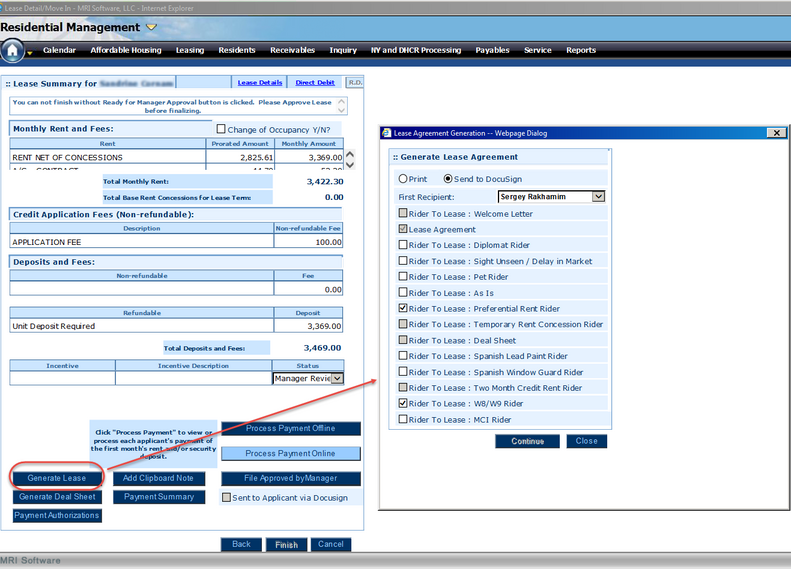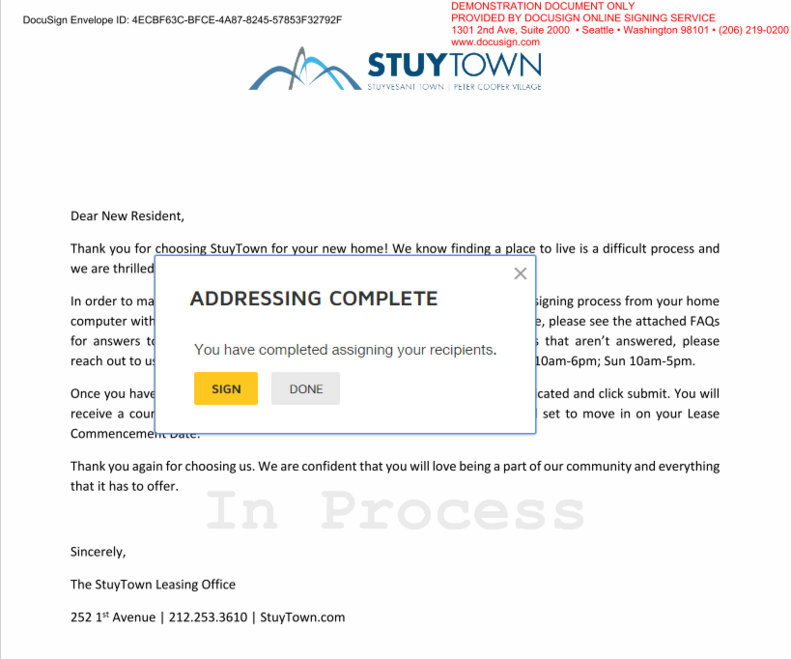Stuytown Increases Efficiency in Apartment Leasing and Reduces Paper by 90% with DocuSign eSignature API
Stuytown Property Services manages an 11,246-unit residential rental development in Manhattan. For the initial implementation of DocuSign, Stuytown focused on their vacancy lease applications, which represent more than 2,000 leases per year.
Leasing is Paper Intensive
Renting an apartment has traditionally been a manual, paper-based process that requires all applicants or tenants to sign a lease (sample lease agreement here), often with multiple pages, disclosures and other documents. Prior to implementing DocuSign, a lease could take as long as ten days to complete. In addition to capturing signatures, Stuytown’s apartment leasing process will, at times, require a guarantor signature for payment, adding more paper, complexity and time as these forms are typically sent via US Mail or FedEx and can add 15 days to the process.
Sending and managing leases with pen and paper was wasting time and money, while creating a poor experience for tenants and staff alike. In fact, Stuytown had a dedicated room to manage and store all of the paper leases, along with the associated personnel required. They realized they needed a better, more efficient, fully digital way to manage leases.
Integrating with the Heart of Stuytown: the MRI API
To manage leases for all of its properties, Stuytown utilizes centralized property management software from MRI Software. MRI tracks all pertinent data about each property, its renters, their status, and more. To become more efficient in sending, receiving, and managing leases digitally, Stuytown customized MRI by integrating with DocuSign’s award-winning eSignature API.
With the seamless integration, Stuytown is able to easily pull data through the MRI API and capture it within digital envelopes to be sent for review and signature using the DocuSign eSignature API. The straightforward solution begins when the Generate Lease button is clicked on the Lease Summary screen shown in Figure 1.

Figure 1: MRI software showing customized Generate Lease button and lease rider selection.
Clicking the Generate Lease button invokes a dialog box (also shown in Figure 1) that enables the leasing agent to select the applicable lease riders to include with the main lease. The apartment lease and lease riders are implemented as DocuSign Templates based on business logic that automatically selects applicable riders based on the type of apartment being rented and data values of the applicant(s). Therefore, some checkboxes shown in Figure 1 are selected by default and others are automatically disabled to ensure leasing documents are always in good order, containing the appropriate main and supplemental documents as a result. After the leasing agent verifies the applicable riders are selected, s/he selects the Send to DocuSign option and clicks Continue, which creates a digital envelope, selects the applicable DocuSign templates based on the rider(s) selected, and routes the documents to the recipients for eSignature.
The leasing agent then verifies the lease, riders, and recipients, and DocuSigns the lease packet. This action automatically sends the DocuSign envelope and all associated documents to each applicant on the lease shown in Figure 2.

Figure 2: The leasing agent verifies all recipients and signs the lease packet.
All applicants (and guarantors, if applicable) must DocuSign the documents – which can be done in any order. After all recipients have DocuSigned the documents, the final step has the leasing team counter-signing the documents. All individuals then automatically receive an email with a link to the completed lease.
Sharpening the Pencil with C#
To leverage their existing Microsoft development skills, Stuytown customized MRI with C# on the Microsoft .NET platform. They wrote custom code for MRI to produce the dialog box shown in Figure 1 and also to interface between the MRI API and the DocuSign eSignature API. Stuytown’s basic workflow is shown in Figure 3.

Figure 3: Stuytown’s basic workflow.
Stuytown also implemented another important feature – the ability to void the envelope from within the MRI user interface. With the simple click of a button, a call to the Envelopes::update method, specifying the desired envelope and other parameters, voids the envelope and all the documents it contains.
Using the free DocuSign C# SDK on GitHub, Stuytown was able to complete the full development cycle with three developers, along with one analyst and one person responsible for quality assurance (QA). Total development time was approximately 800 hours, which included all five resources, end-to-end development, testing, and deployment.
By improving its lease operations, Stuytown was able to increase its efficiency and reduce paper consumption by 90%. The biggest savings have been in time to sign and return leases and riders. As stated by Gregg Haverstick, Senior Director of Information Technology at Stuytown, “After incorporating DocuSign into our process, the leases are now fully executed by multiple lease signers and back in our possession in under one hour.” That means that leases are often completed before an applicant would even have time to look at another property, ensuring they become a future, happy Stuytown tenant as quickly as possible.
Moving Forward
Integrating DocuSign’s eSignature API into Stuytown’s vacancy leasing process was only the beginning. They plan to rollout DocuSign to renewals as well. Stuytown will be able to leverage economies of scale from their existing development efforts for vacancy leasing to quickly and easily integrate the MRI API and DocuSign eSignature API for even more value across their business.
Don’t forget to try-out the power and flexibility of the DocuSign eSignature API for yourself with a free sandbox – just visit the DocuSign Developer Center, and see for yourself why Stuytown chose the DocuSign API.
